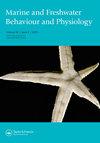Vertical and horizontal movements of bigeye tuna (Thunnus obesus) in southeastern Taiwan
IF 0.9
4区 生物学
Q3 MARINE & FRESHWATER BIOLOGY
Marine and Freshwater Behaviour and Physiology
Pub Date : 2020-12-24
DOI:10.1080/10236244.2020.1852878
引用次数: 3
Abstract
ABSTRACT To learn about the movement patterns of bigeye tuna in eastern Taiwan, pop-up satellite archival tags were attached on five tuna ~55 kg and prematurely detached and popped-up after 32 to 132 days-at-liberty. Two tags were physically recovered and provided fine-scale data archiving the full 47 and 132 days-at-liberty. The deepest descent recorded was 1,292 m and the coldest temperature visited 2.7°C. During daytime, the fish spent the majority of time above 400 m at temperatures from ~10 - 25°C and at nighttime; residency was largely confined to the mixed-layer from the surface to ~100 m. Vertical movements traversing through the thermocline during the daytime are based on physiological constraints and/or rapid directional changes conducive for optimal search strategies that increases the chances of prey encounters. Bigeye tuna appear to follow the diel vertical movements of prey organisms comprising the deep sound scattering layer to exploit them as a resource.台湾东南部大眼鲔鱼的垂直与水平运动
摘要为了解台湾东部大眼金枪鱼的运动规律,将弹出式卫星档案标签贴在5条体重约55公斤的大眼金枪鱼身上,并在32 ~ 132天后提前脱离并弹出。两个标签被物理回收,并提供了完整的47天和132天自由的精细数据存档。有记录的最深落差为1292米,最冷温度为2.7°C。白天和夜间,鱼大部分时间在400米以上,温度在~10 - 25°C之间;居留权主要局限于地表至~100 m的混合层。白天穿越温跃层的垂直运动是基于生理限制和/或快速的方向变化,有利于优化搜索策略,增加遇到猎物的机会。大眼金枪鱼似乎跟随由深声散射层组成的猎物生物的垂直运动,将它们作为一种资源加以利用。
本文章由计算机程序翻译,如有差异,请以英文原文为准。
求助全文
约1分钟内获得全文
求助全文
来源期刊

Marine and Freshwater Behaviour and Physiology
生物-海洋与淡水生物学
CiteScore
2.10
自引率
0.00%
发文量
9
审稿时长
>12 weeks
期刊介绍:
Marine and Freshwater Behaviour and Physiology is devoted to the publication of papers covering field and laboratory research into all aspects of the behaviour and physiology of all marine and freshwater animals within the contexts of ecology, evolution and conservation.
As the living resources of the world’s oceans, rivers and lakes are attracting increasing attention as food sources for humans and for their role in global ecology, the journal will also publish the results of research in the areas of fisheries biology and technology where the behaviour and physiology described have clear links to the contexts mentioned above.
The journal will accept for publication Research Articles, Reviews, Rapid Communications and Technical Notes (see Instructions for authors for details). In addition, Editorials, Opinions and Book Reviews (invited and suggested) will also occasionally be published. Suggestions to the Editor-In-Chief for Special Issues are encouraged and will be considered on an ad hoc basis.
With the goal of supporting early career researchers, the journal particularly invites submissions from graduate students and post-doctoral researchers. In addition to recognising the time constraints and logistical limitations their research often faces, and their particular need for a prompt review process, accepted articles by such researchers will be given prominence within the journal (see Instructions for authors for details).
 求助内容:
求助内容: 应助结果提醒方式:
应助结果提醒方式:


